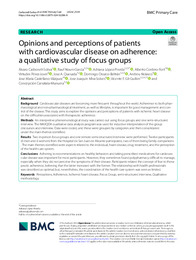Por favor, use este identificador para citar o enlazar este ítem:
https://hdl.handle.net/11000/34960Registro completo de metadatos
| Campo DC | Valor | Lengua/Idioma |
|---|---|---|
| dc.contributor.author | Carbonell‑Soliva, Álvaro | - |
| dc.contributor.author | NouniI García, Rauf | - |
| dc.contributor.author | Lopez-Pineda, Adriana | - |
| dc.contributor.author | Cordero‑Fort, Alberto | - |
| dc.contributor.author | Pérez-Jover, Virtudes | - |
| dc.contributor.author | Quesada, Jose A. | - |
| dc.contributor.author | Orozco-Beltran, Domingo | - |
| dc.contributor.author | Nolasco, Andreu | - |
| dc.contributor.author | Castellano‑Vázquez, Jose Maria | - |
| dc.contributor.author | Mira‑Solves, Jose Joaquín | - |
| dc.contributor.author | Gil-Guillén, Vicente F | - |
| dc.contributor.author | Carratala‑Munuera, Concepción | - |
| dc.contributor.other | Departamentos de la UMH::Medicina Clínica | es_ES |
| dc.date.accessioned | 2025-01-18T12:40:48Z | - |
| dc.date.available | 2025-01-18T12:40:48Z | - |
| dc.date.created | 2024-02-16 | - |
| dc.identifier.citation | BMC Prim Care . 2024 Feb 16;25(1):59 | es_ES |
| dc.identifier.issn | 2731-4553 | - |
| dc.identifier.uri | https://hdl.handle.net/11000/34960 | - |
| dc.description.abstract | Background Cardiovascular diseases are becoming more frequent throughout the world. Adherence to both pharmacological and non-pharmacological treatment, as well as lifestyles, is important for good management and control of the disease. This study aims to explore the opinions and perceptions of patients with ischemic heart disease on the difficulties associated with therapeutic adherence. Methods An interpretive phenomenological study was carried out using focus groups and one semi-structured interview. The MAXQDA qualitative data analysis program was used for inductive interpretation of the group discourses and interview. Data were coded, and these were grouped by categories and then consolidated under the main themes identified. Results Two in-person focus groups and one remote semi-structured interview were performed. Twelve participants (6 men and 6 women) from the Hospital de San Juan de Alicante participated, two of them being family companions . The main themes identified were aspects related to the individual, heart disease, drug treatment, and the perception of the health care system. Conclusions Adhering to recommendations on healthy behaviors and taking prescribed medications for cardiovascular disease was important for most participants. However, they sometimes found polypharmacy difficult to manage, especially when they did not perceive the symptoms of their disease. Participants related the concept of fear to therapeutic adherence, believing that the latter increased with the former. The relationship with health professionals was described as optimal, but, nevertheless, the coordination of the health care system was seen as limited. | es_ES |
| dc.format | application/pdf | es_ES |
| dc.format.extent | 11 | es_ES |
| dc.language.iso | eng | es_ES |
| dc.publisher | Board | es_ES |
| dc.rights | info:eu-repo/semantics/openAccess | es_ES |
| dc.rights | Attribution-NonCommercial-NoDerivatives 4.0 Internacional | * |
| dc.rights.uri | http://creativecommons.org/licenses/by-nc-nd/4.0/ | * |
| dc.subject | perceptions, | es_ES |
| dc.subject | adherence | es_ES |
| dc.subject | ischemic heart disease, | es_ES |
| dc.subject | semi-structured interview | es_ES |
| dc.subject | qualitative methodology | es_ES |
| dc.title | Opinions and perceptions of patients with cardiovascular disease on adherence: a qualitative study of focus groups | es_ES |
| dc.type | info:eu-repo/semantics/article | es_ES |
| dc.relation.publisherversion | 10.1186/s12875-024-02286-8 | es_ES |

Ver/Abrir:
Opinions and perceptions of patients.pdf
1,12 MB
Adobe PDF
Compartir:
 La licencia se describe como: Atribución-NonComercial-NoDerivada 4.0 Internacional.
La licencia se describe como: Atribución-NonComercial-NoDerivada 4.0 Internacional.
.png)